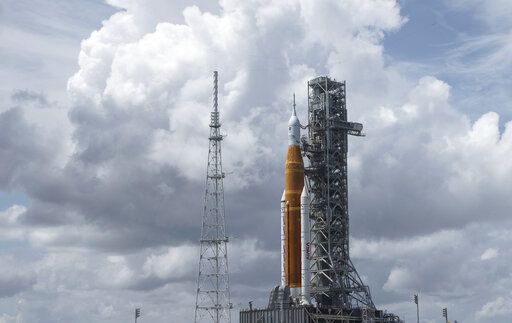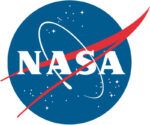NASA aims for Saturday launch of new moon rocket: Take 2
In this photo provided by NASA, NASA’s Space Launch System (SLS) rocket with the Orion spacecraft aboard is seen atop the mobile launcher at Launch Pad 39B, Tuesday, Aug. 30, 2022, at Kennedy Space Center in Cape Canaveral, Fla.. NASA’s Artemis I flight test is the first integrated test of the agency’s deep space exploration systems: (Joel Kowsky/NASA via AP)
CAPE CANAVERAL, Fla. (AP) — NASA will try again Saturday to launch its new moon rocket on a test flight, after engine trouble halted the first countdown this week.
Managers said Tuesday they are changing fueling procedures to deal with the issue.
The 322-foot (98-meter) rocket remains on its pad at Kennedy Space Center, with an empty crew capsule on top. It’s the most powerful rocket ever built by space agency.
The Space Launch System rocket, or SLS, will attempt to send the capsule around the moon and back. No one will be aboard, just three test dummies. If successful, it will be the first capsule to fly to the moon since NASA’s Apollo program 50 years ago.
During Monday’s launch attempt, one of the four main engines in the rocket’s core stage could not be chilled sufficiently prior to planned ignition moments before liftoff. The three others came up just a little short.
The chilling operation will be conducted a half-hour earlier for Saturday afternoon’s try, once fueling is underway at the pad, officials said.
John Honeycutt, NASA’s program manager for the rocket, told reporters that the timing of this engine chilldown was earlier during successful testing last year, and so moving it sooner may do the trick.
Honeycutt also questioned the integrity of one engine sensor, saying it might have provided inaccurate data Monday. To change that sensor, he noted, would mean hauling the rocket back into the hangar, which would mean weeks of delay.
The $4.1 billion test flight is the opening shot in NASA’s Artemis moon-exploration program, named after the twin sister of Apollo in Greek mythology. Astronauts could strap in as soon as 2024 for a lap around the moon and actually attempt a lunar landing in 2025.
___
The Associated Press Health and Science Department receives support from the Howard Hughes Medical Institute’s Department of Science Education. The AP is solely responsible for all content.
(Joel Kowsky) For copyright and restrictions refer to – http://www.nasa.gov/multimedia/guidelines/index.html
Copyright 2022 The Associated Press. All rights reserved.


